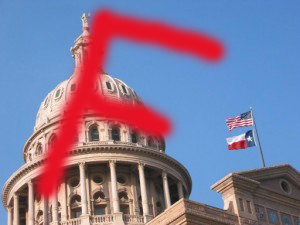Why government?
John Locke arguably influenced constitutional framers and ratifiers to a greater degree than any other political philosopher. He advanced the idea of individual sovereignty, that each of us possesses a natural, God-given right to self-determination. He argued that people join to together in society and grant certain powers to government for a limited and express purpose.
“It is not without reason that he seeks out, and is willing to join in society with others, who are already united or have a mind to unite, for the mutual preservation of their lives, liberties and estates, which I call by the general name property. The great and chief end, therefore, of men’s uniting into commonwealths and putting themselves under government is the preservation of their property.”
Judging the Texas legislature’s performance by Lock’s criteria, I have to rate its performance an epic fail.
After weeks of the obfuscating, blame gaming and political posturing, Texas lawmakers failed to pass an anti-groping bill that would have protected their citizens from unwarranted federal touching, poking and prodding. They failed in their most basic function. Failed to protect a vital component of the people’s property. Failed to defend the liberty of Texans.
Tenth Amendment Center founder and executive director Michael Boldin summed up.
“It’s a state’s duty to stop the TSA, because the TSA is never going to stop itself.”
The people grant certain, specific and enumerated powers to the federal government. The rest they reserve to their state governments and to themselves. When the federal government lays hold of powers not rightly belonging to it, the state government should step in on behalf of its people.
James Madison articulated this idea in the Virginia Resolutions of 1798.
In case of a deliberate, palpable, and dangerous exercise of other powers, not granted by the said compact, the states who are parties thereto, have the right, and are in duty bound, to interpose for arresting the progress of the evil, and for maintaining within their respective limits, the authorities, rights and liberties appertaining to them.
Duty bound.
I could go into a lengthy analysis of the Fourth Amendment and explain how the federal government oversteps its authority every time it grabs an airline passenger’s crotch without probable cause. I could go into background and history. I could quote founders and political philosophers.
But really, do I need to?
 Doesn’t the sight of former Miss USA Susie Castillo crying because she felt utterly violated at a TSA checkpoint tell the story? Doesn’t the thought of a mentally challenged young man boarding a plane without a treasured possession because some TSA goon thought a plastic hammer “could be used as a weapon” tell the story? Doesn’t the image of a 95-year-old dying grandmother, wanting only to board a plane so she could spend her last days on earth with her family, stripping off her Depends after a 45 minute pat-down ordeal tell the story? Or how about a 6-year-old child, crying, questioning her mother, “Did I do something wrong?” after a badged agent decided rubbing her hands over the child was vital to national security?
Doesn’t the sight of former Miss USA Susie Castillo crying because she felt utterly violated at a TSA checkpoint tell the story? Doesn’t the thought of a mentally challenged young man boarding a plane without a treasured possession because some TSA goon thought a plastic hammer “could be used as a weapon” tell the story? Doesn’t the image of a 95-year-old dying grandmother, wanting only to board a plane so she could spend her last days on earth with her family, stripping off her Depends after a 45 minute pat-down ordeal tell the story? Or how about a 6-year-old child, crying, questioning her mother, “Did I do something wrong?” after a badged agent decided rubbing her hands over the child was vital to national security?
No. We don’t need legal analysis or a history lesson to understand.
TSA procedures represent a grievous violation. Not just a violation of our rights, but a violation of our dignity.
And they did nothing.
Those Texas legislators responsible for allowing this bill to die stand guilty of dereliction of duty.
- Thomas Jefferson’s Warnings and Predictions about the Dangers of Money-Printing - April 18, 2024
- Utah’s Step-By-Step Strategy in Support of Sound Money - April 9, 2024
- Utah’s Step-By-Step Strategy Against the Surveillance State - April 1, 2024

